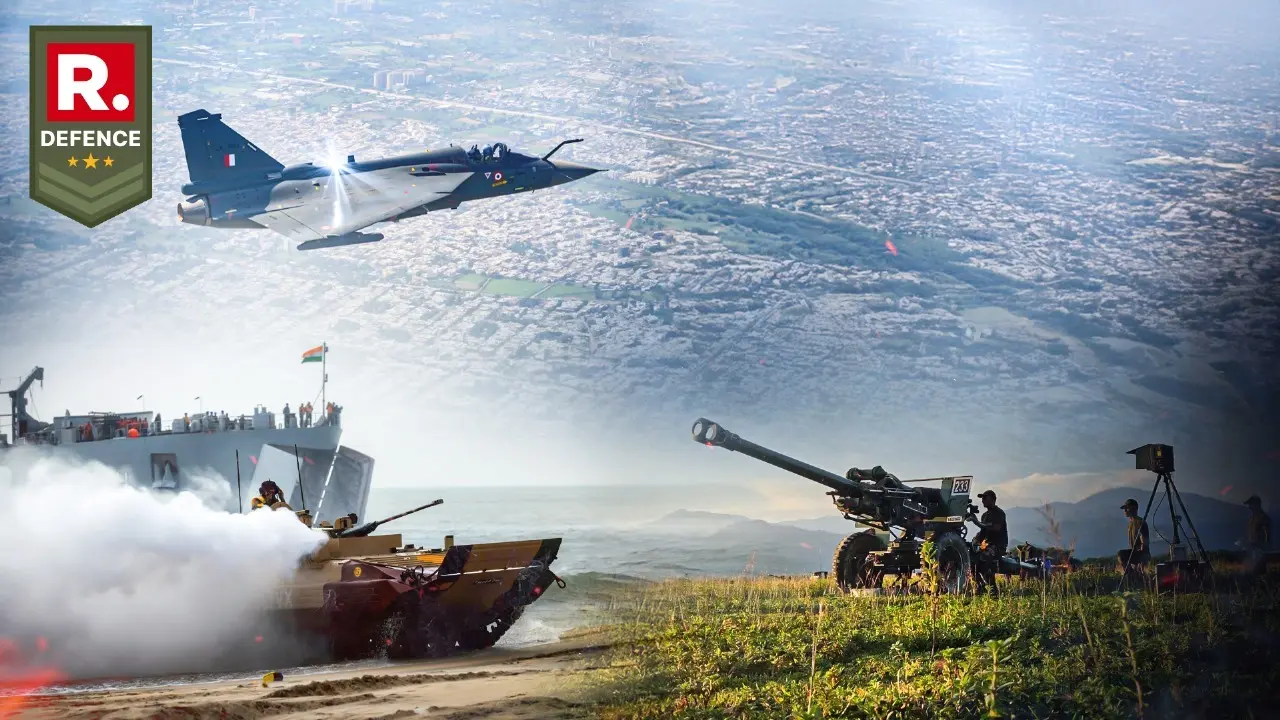Updated 14 September 2024 at 14:37 IST
India’s Ambitious Rs 50,000 Crore Defence Exports Target to go hand-in-hand with Atmanirbharta
India's Ministry of Defence has set an ambitious target of exporting over Rs 50,000 crore worth of defense equipment by 2028-2029.
- Defence News
- 5 min read

New Delhi, India: On assuming charge as the Union Minister of Defence for the second consecutive time, Mr. Rajnath Singh stated that one of the ministry's targets would be to export over Rs 50,000 crore worth of defence equipment by 2028-2029. This seemingly ambitious objective is attainable, considering the past track record. From 2016-17, starting at an exiguous Rs.1,522 crore, India's defence exports witnessed year-on-year increases of 207% and 129.5%, reaching Rs. 4,682 crore and Rs. 10746 crore in 2017-18 and 2018-19 respectively. Following two consecutive dips from 2019-2021, the exports have grown consistently in the post-pandemic years, showing remarkable resilience and commitment to the target.
The move should not be intended to make India a leading arms exporter. Not even close, as India does not figure even in the top 25 arms exporters in the period 2019-2023, as per the fact sheet released by Stockholm International Peace Research Institute(SIPRI). However, it does attain the top spot in the list of the largest importers of major arms for the same period. This trend will likely persist as India is expected to spend $220 billion in the next ten years to modernize and integrate its armed forces. That is precisely why India has envisaged an export strategy to facilitate self-reliance in defence.
Indigenization: The Driving Force Behind Export Growth
Indigenization has come on the back of increased private sector participation, improvement in the performance of defence PSUs, revised FDI norms, Positive Indigenization Lists and key projects like the Light Combat Aircraft and INS Vikrant reaching their Final Operation Clearance (FOC) and commissioning stages over the last few years. While these developments have laid the foundations, establishing an ecosystem for future developments, there is still a considerable gap between its huge arms import bill and its production capacity.

A recent survey by Nexgen Exhibitions Pvt Ltd, a company that organizes various security-related expos, underscored the need for increased focus on Research and Development and technology integration, which could potentially boost defence exports to $5 Billion this year itself. Even with government and private spending, the domestic defence industry would have limited opportunities for investment in research and development and production if it depended solely on domestic demand. In order to leverage economies of scale and stay relevant, India's industrial defence policy has to be supplemented with a robust export strategy.
Advertisement
Driving Forces Behind Indigenization and Export Growth
The Department of Defence Production (DDP), responsible for the export of Arms and Ammunition, proposed the creation of a not-for-profit company under the Companies Act, specifically as an export promotion/ facilitation body with participation from industry representatives. At present, there exists an Export Promotion Cell (EPC) under the DDP that facilitates coordination between the Industry, MoD, and potential buyer countries. On the other hand, The Defence Innovation Organization (DIO) is a section 8 company that manages the Innovation for Defence Excellence (iDEX) platform for fostering innovation and technology development by engaging individuals, start-ups, MSMEs and other stakeholders. iDEX has been proactive in roping in indigenous producers, having cleared procurement of up to Rs. 2000 crores since its inception in 2018. Innovations identified as industry-worthy should not be confined to the domestic market. An export promotion ecosystem that brings coordination between iDEX and EPC will bridge the glaring gap between finding innovative talent and marketing it to other countries that look forward to buying from India.

The Scheme for the promotion of Defence Exports provides two options for turning Defence manufacturers into prospective exporters. One is to provide certificates to technically qualified vendors for marketing their products in the international market. Another option is for prospective exporters with the capacity to produce export-worthy items to test their products using the testing infrastructure/laboratories of the MoD, subject to certain conditions. Once certified, such products can become a part of an arsenal under the Defence Industrial Corridors that not only invests in upgrading their technical standards but also in branding and marketing the same as potential force multipliers for the security needs of buyer countries.
Advertisement
Brand India in Defence: A Global Marketing Strategy
The Promotion of Brand India in Defence scheme aims to provide financial assistance to Indian Defence Attaches in different countries to undertake promotional activities for India's defence products. This is where the job only begins. DDP needs to be equipped with measures to relentlessly follow up and execute any expressions of interest from the enquiry stage right up till delivery, all within a suitable time frame. This would boost the credibility of India's defence exports and aid in reducing bottlenecks in clearances to trade.

Defence is a peculiar industry. It involves long development cycles, short life cycles, high costs, regulations and ethical considerations. Moreover, the nature of India's security apparatus requires that the government handholds the industry as it supervises its operations. To make this industry self-sufficient, it is essential that the government provides market intelligence, supports innovative branding, encourages pathbreaking research and facilitates seamless delivery of military equipment that has the potential to go global.
Published By : Yuvraj Tyagi
Published On: 14 September 2024 at 14:37 IST
